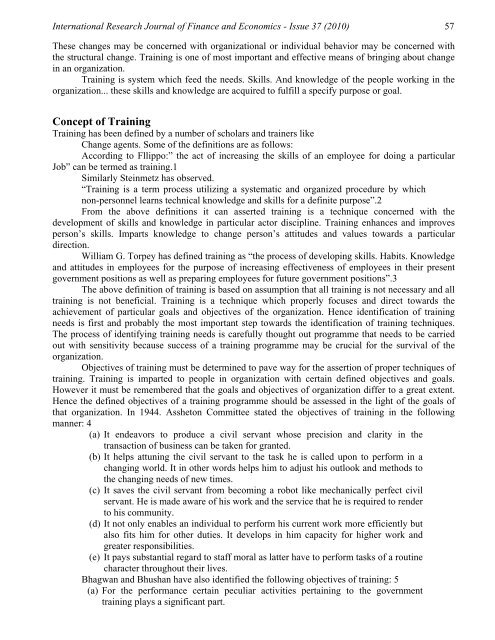Methods of Evaluation: Training Techniques - EuroJournals
Methods of Evaluation: Training Techniques - EuroJournals
Methods of Evaluation: Training Techniques - EuroJournals
Create successful ePaper yourself
Turn your PDF publications into a flip-book with our unique Google optimized e-Paper software.
International Research Journal <strong>of</strong> Finance and Economics - Issue 37 (2010) 57<br />
These changes may be concerned with organizational or individual behavior may be concerned with<br />
the structural change. <strong>Training</strong> is one <strong>of</strong> most important and effective means <strong>of</strong> bringing about change<br />
in an organization.<br />
<strong>Training</strong> is system which feed the needs. Skills. And knowledge <strong>of</strong> the people working in the<br />
organization... these skills and knowledge are acquired to fulfill a specify purpose or goal.<br />
Concept <strong>of</strong> <strong>Training</strong><br />
<strong>Training</strong> has been defined by a number <strong>of</strong> scholars and trainers like<br />
Change agents. Some <strong>of</strong> the definitions are as follows:<br />
According to Fllippo:” the act <strong>of</strong> increasing the skills <strong>of</strong> an employee for doing a particular<br />
Job” can be termed as training.1<br />
Similarly Steinmetz has observed.<br />
“<strong>Training</strong> is a term process utilizing a systematic and organized procedure by which<br />
non-personnel learns technical knowledge and skills for a definite purpose”.2<br />
From the above definitions it can asserted training is a technique concerned with the<br />
development <strong>of</strong> skills and knowledge in particular actor discipline. <strong>Training</strong> enhances and improves<br />
person’s skills. Imparts knowledge to change person’s attitudes and values towards a particular<br />
direction.<br />
William G. Torpey has defined training as “the process <strong>of</strong> developing skills. Habits. Knowledge<br />
and attitudes in employees for the purpose <strong>of</strong> increasing effectiveness <strong>of</strong> employees in their present<br />
government positions as well as preparing employees for future government positions”.3<br />
The above definition <strong>of</strong> training is based on assumption that all training is not necessary and all<br />
training is not beneficial. <strong>Training</strong> is a technique which properly focuses and direct towards the<br />
achievement <strong>of</strong> particular goals and objectives <strong>of</strong> the organization. Hence identification <strong>of</strong> training<br />
needs is first and probably the most important step towards the identification <strong>of</strong> training techniques.<br />
The process <strong>of</strong> identifying training needs is carefully thought out programme that needs to be carried<br />
out with sensitivity because success <strong>of</strong> a training programme may be crucial for the survival <strong>of</strong> the<br />
organization.<br />
Objectives <strong>of</strong> training must be determined to pave way for the assertion <strong>of</strong> proper techniques <strong>of</strong><br />
training. <strong>Training</strong> is imparted to people in organization with certain defined objectives and goals.<br />
However it must be remembered that the goals and objectives <strong>of</strong> organization differ to a great extent.<br />
Hence the defined objectives <strong>of</strong> a training programme should be assessed in the light <strong>of</strong> the goals <strong>of</strong><br />
that organization. In 1944. Assheton Committee stated the objectives <strong>of</strong> training in the following<br />
manner: 4<br />
(a) It endeavors to produce a civil servant whose precision and clarity in the<br />
transaction <strong>of</strong> business can be taken for granted.<br />
(b) It helps attuning the civil servant to the task he is called upon to perform in a<br />
changing world. It in other words helps him to adjust his outlook and methods to<br />
the changing needs <strong>of</strong> new times.<br />
(c) It saves the civil servant from becoming a robot like mechanically perfect civil<br />
servant. He is made aware <strong>of</strong> his work and the service that he is required to render<br />
to his community.<br />
(d) It not only enables an individual to perform his current work more efficiently but<br />
also fits him for other duties. It develops in him capacity for higher work and<br />
greater responsibilities.<br />
(e) It pays substantial regard to staff moral as latter have to perform tasks <strong>of</strong> a routine<br />
character throughout their lives.<br />
Bhagwan and Bhushan have also identified the following objectives <strong>of</strong> training: 5<br />
(a) For the performance certain peculiar activities pertaining to the government<br />
training plays a significant part.

















